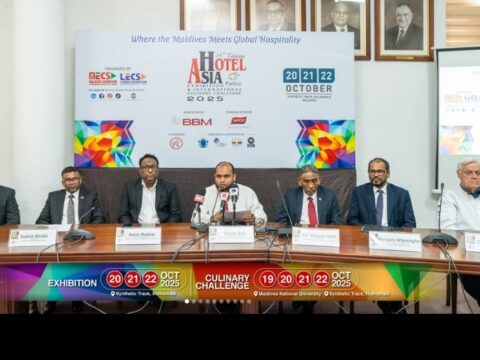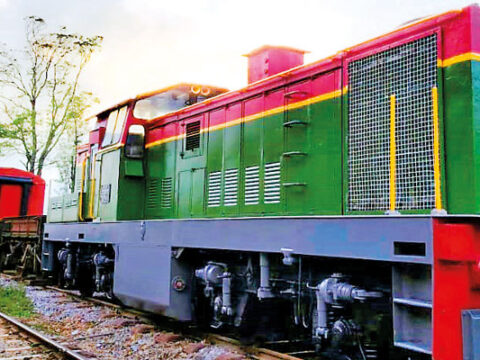COLOMBO: UNP Leader Ranil Wickremesinghe was sworn in Thursday, 21 July, as the 8th Executive President of Sri Lanka at the Parliament premises. He was sworn in before Chief Justice Jayantha Jayasuriya.
The Sri Lankan parliament on Wednesday had voted to elect Wickremesinghe, acting President and Leader of the United National Party as Sri Lanka’s new President.
The returning officer Secretary-General of parliament Dhammika Dassanayake announced that 223 of the 225 members of Parliament voted for the three candidates – Acting President Ranil Wickremesinghe, MP Dullas Alahapperuma and MP Anura Kumara Dissanayake – while two MPs abstained from voting. Four votes were considered invalid.
In the secret ballot Wickremesinghe received 134 votes against the 82 votes received by Dullas Alahapperuma. The Leader of National People’s Power Anura Kumara Dissanayake received 3 votes. Only a few lawmakers had publicly said they would vote for Wickremesinghe given the hostility against him.
Accepting the Presidency, UNP leader thanked the MPs who supported him as well as the MPs who participated in the democratic process.
“We have to create a new strategy to move forward. People are not asking for the old politics. They are asking that the parliament carry forward the work in a united manner,” he said.
“We were divided for the last 48 hours. That period is now over. We have to work together now,” he added.
The 8th Executive President invited his opponents Dullas Alahapperuma and Anura Kumara Dissanayake as well as the Leader of Opposition Sajith Premadasa and former Presidents Maithripala Sirisena and Mahinda Rajapaksa, who also voted in the first parliamentary election to choose a new president, to join him for discussions to reform the political system and rebuild the country.
Wickremesinghe faces the daunting task of leading the country out of its economic collapse and restoring order after months of mass protests that drove out Sri Lanka’s ex-president Gotabaya Rajapaksa, who fled the country last week to Maldives and then on to Singapore. Protestors had also called for the resignation of Mr Wickremesinghe, considered a close supporter of the Rajapaksa dynasty, a claim Wickremesinghe rejccted after winning the presidential vote in parliament.
Protesters last week burnt down his private home and also stormed his prime ministerial office in Colombo in demonstrations against his leadership. On hearing the news of Wickremesinghe’s election, protestors have vowed to continue their campaign for his ouster.
Presidents in Sri Lanka are normally elected by the public. The responsibility falls on Parliament only if the office of president becomes vacant before a term officially ends.
That has happened only once before in Sri Lanka when then-Prime Minister Dingiri Banda Wijetunga was chosen by Parliament uncontested in 1993 after former President Ranasinghe Premadasa, father of the current opposition leader, was assassinated.
The economic crisis has left Sri Lanka’s 22 million people struggling with shortages of essentials including medicine, fuel and food while the government negotiates a bailout with the International Monetary Fund. And the resulting political crisis has left worries about whether a new government will be enough to fix the economy and placate a public furious at its politicians’ failures.
Several Colombo-based diplomats have reacted to Wickremesinghe’s appointment, reiterating their country’s commitment to supporting Sri Lanka and calling for urgent political and economic reforms to speed up Sri Lanka’s recovery and ensure a stable and prosperous future.
US Ambassador Julie Chung said, “ We look forward to working with new President Ranil Wickremesinghe”.
“In these challenging times, it will be essential for all parties to redouble efforts to work together to tackle the economic crisis, uphold democracy and accountability, and build a stable and secure future for all Sri Lankans”, she added.
The Indian High Commission in Colombo said the Parliament of Sri Lanka, in the exercise of the provisions of the Sri Lankan Constitution, has today elected Ranil Wickremesinghe as the President of Sri Lanka.
“As a close friend and neighbour of Sri Lanka and a fellow democracy, we will continue to be supportive of the quest of the people of Sri Lanka for stability and economic recovery, through democratic means and values, established democratic institutions, and constitutional framework,” the Indian High Commission said.
British High Commissioner Sarah Hulton said the United Kingdom (UK) looks forward to working with the new government led by Sri Lanka President Ranil Wickremesinghe, as it works to meet the needs of all Sri Lankans, including calls for political & economic reforms.
“We urge all parties to protect democratic and inclusive governance, including the right to peaceful protest,” she added.
The Canadian High Commission in Colombo said Canada takes note of the parliamentary election of President Ranil Wickremesinghe, in keeping with Sri Lanka’s Constitution.
“We encourage efforts toward urgent political and economic reforms to alleviate the hardships faced by the peoples of the island. We strongly encourage the Sri Lankan government to promote and respect democracy and human rights as it works to address this crisis,” the High Commission said.
The Australian High Commission in Colombo said Ranil Wickremesinghe has been elected as Sri Lanka’s President through a democratic, constitutional process
“Australia now encourages the new government to work toward long-term economic stability, including with the International Monetary Fund (IMF). Australia will continue to support the people of Sri Lanka.”
Michael Appleton, the New Zealand High Commissioner for Sri Lanka said the election of Ranil Wickremesinghe as the country’s new President will be the first step in a political transition, which will include the appointment of a new Prime Minister and Cabinet.
“New Zealand looks forward to the formation of an inclusive government, in line with the will of Parliament and the Sri Lankan people. Sri Lankans continue to face considerable hardship as a result of the economic crisis. There is an urgent need for an agreement to be reached with the IMF, and for corresponding economic reforms to be implemented. New Zealand will continue to work, alongside international partners, to help Sri Lankans during this very challenging time, he added.




